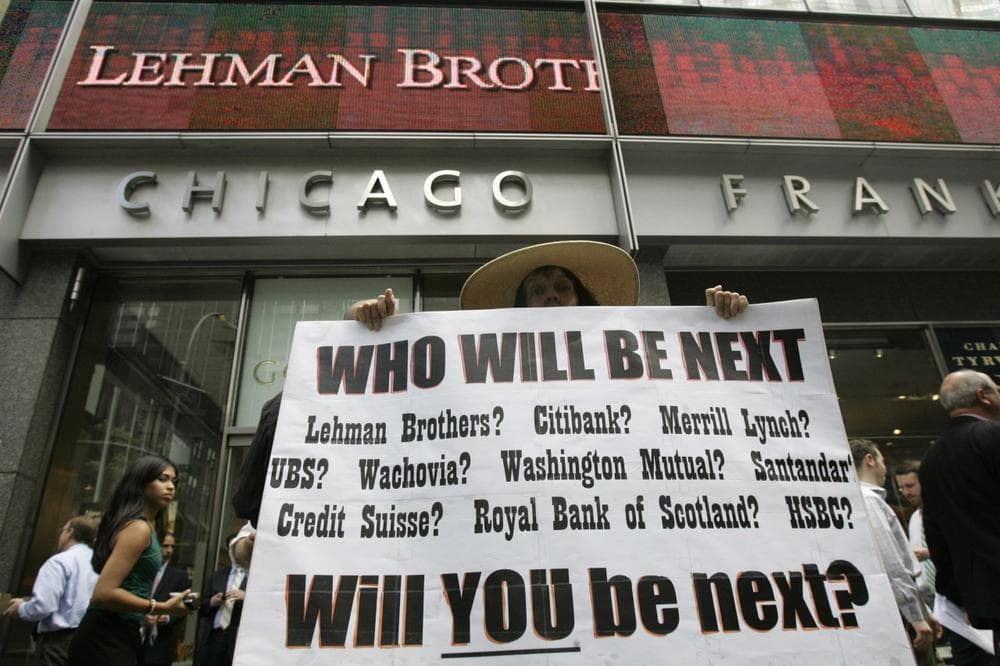Advertisement
Five Years After Lehman Brothers Collapsed, What's Changed?
ResumeFive years after the collapse of Lehman Brothers, we look at the bust that followed, what’s been cleaned up on Wall Street, and what has not.

Five years ago this week, Wall Street and the world shook when mighty Lehman Brothers bit the dust. Collapsed in bankruptcy. It had been a towering American finance pillar – right up there with Goldman Sachs and Morgan Stanley and the rest, and in the same kind of business – and then, overnight, it was nothing but wreckage. The world economy came within a hair of nightmare Depression. And the Great Recession we did have brought loss and suffering all over. Has Wall Street reformed? Barely. Could it happen again. Incredibly, yes. Up next On Point: five years after Lehman.
-- Tom Ashbrook
Guests
Bethany McLean, contributing editor at Vanity Fair, columnist for Reuters and contributor at CNBC, co-author with New York Times columnist Joe Nocera of "All The Devils are Here: The Hidden History of the Financial Crisis."
Alan Blinder, professor of economics and public affairs at Princeton University, former member of the Council of Economic Advisers and former vice chairman of the Board of Governors of the Federal Reserve System; author of "After the Music Stopped: The Financial Crisis, the Response, and the Work Ahead."
From Tom's Reading List
The Wall Street Journal: Five Years Later, Financial Lessons Not Learned — "Years of disgraceful financial shenanigans in the 2000s, some illegal but many just immoral, brought on the Great Recession with virtually no help from any co-conspirators. Congress and President Obama reacted comparatively weakly with the Dodd-Frank Act of 2010, which certainly did not seek to remake the U.S. financial system. I am a big supporter of Dodd-Frank, despite its timidity, because laws must be graded on a curve. Sadly, even this good-though-weak law now seems to be withering on the regulatory vine. Far from being tamed, the financial beast has gotten its mojo back—and is winning. The people have forgotten—and are losing."
Slate: What We Haven't Learned From the Crisis — "This weekend marks the fifth anniversary of Lehman Brothers’ final, chaotic descent into bankruptcy. The investment bank wasn’t the first American financial institution to drown in bad bets on mortgage-backed securities. But unlike those that had come before, Lehman wasn’t covered by the FDIC and its resolution process. And despite the scrambling efforts of the Treasury Department and Federal Reserve, there was no way to quasi-save it through the kind of shotgun marriage that was deployed to sell Bear Stearns to JPMorgan Chase. Lehman was going down, and all officials could do was wait to see what happened next."
Reuters: The Crackdown on Bank Misbehavior Masks a Troubling Reality — "By one measurement, the problem has gotten worse by an order of magnitude in recent years. In the annual letter he writes to shareholders, Robert Wilmers, the chairman and CEO of M&T Bank, has started keeping track of the fines, sanctions and legal awards levied against the “Big Six” bank holding companies. In 2011, those penalties were $13.9 billion. In 2012, they more than doubled to $29.3 billion. Wilmers writes that the past two years represent the majority of the cumulative $52 billion in charges, from 236 separate actions in eight countries, over the past 11 years. Wilmers also cites a study done by M&T, according to which the top six banks have been cited 1,150 times by the Wall Street Journal and the New York Times in articles about their improper activities. "
This program aired on September 17, 2013.